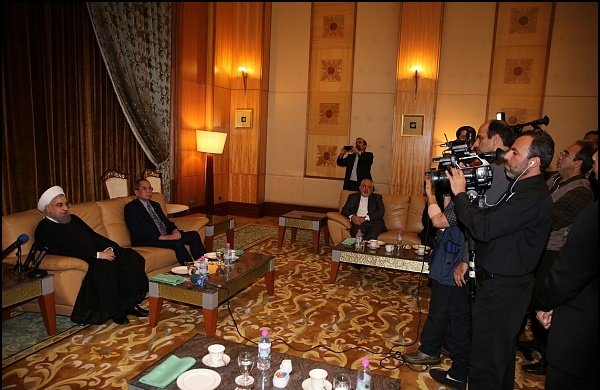As long as Iran's foreign policy attaches great significance to Asian states, South-East Asian nation in particular, the Islamic Republic is fully determined to strengthen strategic cooperation with the region.
Last week, Iranian President Hassan arrived in Kuala Lumpur to promote relations and discuss ways improving ties with the Muslim country leading a high ranking political and economic delegation on the second leg of his regional tour to South-East Asian nations which has already taken him to Vietnam.
While leaving Tehran for Hanoi, Rouhani said the Malaysia visit aims to repair the bilateral ties, which have unfortunately suffered a decline in recent years.
While in Malaysia, President Rouhani held talks with a number of high-ranking Malaysian officials including Prime Minister Najib Tun Razak, Parliament Speaker Pandikar Amin Mulia and a number of academics, intellectuals and media leaders in this Muslim country.
Revival of Iran- Malaysia Bilateral Ties
President Rouhani in a joint press conference with Razak called for revival of bilateral ties between Iran and the Southeast Asia nation.
Thanks to the opportunities have been created in Iran following the post-sanctions era, Rouhani underscored that Tehran and Kuala Lumpur plan to revitalize ties to the previous level and after that double the level of cooperation.
Referring the scientific, technological, academic and tourism potential, Iranian president stressed that Iran welcomes Malaysian companies which are active in the fields of oil, gas and petrochemicals as well as the Halal food industry.
Describing terrorism as a common threat, he called for unity among various followers of Islamic sects and urged all countries to do their best to tackle terrorism and extremism.
Boosting Banking Ties
Meanwhile, the Malaysian prime minister stressed immediate action to boost bilateral banking cooperation, urging for the two countries' central banks immediate action to find mechanisms for shortening the time needed for banking transactions.
Referring to dimming bilateral economic cooperation between Tehran and Kuala Lumpur in the time Iran was under sanctions, Razak said that the country's minister of Agriculture and Agro-based Industries will visit Iran in the near future to explore ways of developing mutual cooperation.
He added Malaysia is interested in Iran's oil and gas sector, auto industry and road construction while it seeks to cooperate with the Islamic Republic in field of tourism.
The Malaysian minister also called for further cooperation among the Islamic countries for establishment of peace and stability in the Islamic World.
Fostering Parliamentary Cooperation
In a meeting with Mulia, President Rouhani called for developing bilateral ties and regional issues.
Back in August, Mulia in a meeting with his Iranian counterpart Ali Larijani in Tehran said the Islamic Republic plays a pivotal role in the region, adding Malaysian government would pave the ground for improving trade cooperation with Iran.
Larijani, for his part, said Iran and Malaysia have very similar views on the ongoing crises in the Middle East, particularly terrorism, adding the two sides believed that regional crises have caused many problems for the security of Muslim countries.
Pointing to the two sides’ talks about ways to improve parliamentary and economic relations, Larijani said Iran attaches great importance to bolstering ties with Malaysia as an important Muslim country.
Iran’s Leading Role in Region
Addressing a group of Malaysian academics, intellectuals and media leaders in Kuala Lumpur, President Rouhani said Middle East could have faced with a major war if the Islamic Republic of Iran had not helped to deal with the regional crises.
Without the Islamic Republic's help, President Rouhani said, the region would have faced with the big government of Daesh in Syria and Iraq instead of the Deash terrorist group.
The president said tackling Takfiri terrorism, effective assistance to the establishment of peace and ceasefire, expanding humanitarian aid to the people, non-disintegration of the countries, not changing the geographical borders, and relying on the ballot box and sovereignty of the people in control of their own countries are Iran's main regional policies.
He warned that the regional war could have turned into an international one, urging the Islamic world to help in this respect.
Citing terrorism as a dilemma in the region, President Rouhani underscored that the Takfiri terrorists should be uprooted in the whole region.
'We should not allow the killing and slaughtering of people to continue in the region and the disaster should be prevented,' he said.
Commenting on the necessity of establishing peace and ceasefire in Yemen and Syria, he called for extending humanitarian assistance to the war-hit people as soon as possible.
He also added that the western countries are trying to dominate the world in technological and scientific arenas.
As long as Iran and Malaysia have always enjoy amicable and growing relations, the visit would pave the way for more flourishing relations between the two countries.
